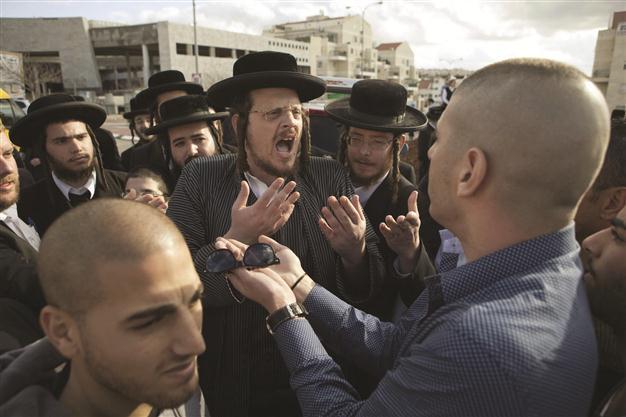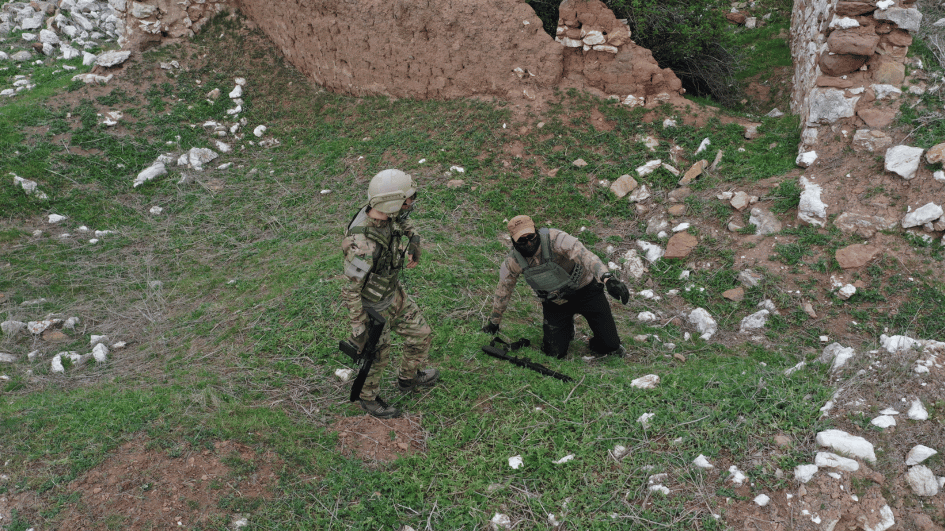Naama’s plight reveals Israel’s extremism issue
BEIT SHEMESH, Israel

Secular Israelis (R) argue with ultra-Orthodox Jewish protesters in the central town of Beit Shemesh. AFP photo
Israeli police and ultra-Orthodox Jewish protesters, Haredis, the Hebrew term for the ascetic, black-coated Jews who are in “awe” of God, clashed in a town near Jerusalem over televised footage of an 8-year-old Israeli girl, Naama Margolese, complaining of verbal abuse from black-robed Orthodox men while on her way to school. After the incidents secular activists were expected to organize a demonstration yesterday evening against ultra-Orthodox Jewish coercion and violence.The violence came after a wave of incidents elsewhere in Israel in which women have been compelled to sit at the back of segregated buses serving ultra-Orthodox areas or get off, despite court rulings that women may sit where they please.
Images broadcast on Channel Two last week of an ultra-Orthodox man in Beit Shemesh, a town of roughly 80,000 people 30 kilometers west of Jerusalem, spitting at a woman led to his arrest Dec. 24 night. He was freed by magistrates Dec. 25. The same broadcast featured a religious 8-year-old girl terrified to walk the short distance between her home and school because she had been subjected to the verbal abuse of ultra-Orthodox men who claimed her attire was not sufficiently “modest.”
Secular activists were expected to organize a demonstration in Beit Shemesh and said they expected 10,000 participants. The demonstration will be joined by religious and some ultra-Orthodox Jews, who are making efforts to differentiate between the mainstream orthodoxy and such extremists. Prime Minister Benjamin Netanyahu vowed Dec. 25 to crack down on acts of gender separation and ultra-orthodox violence toward women, and keep the public “open and safe to everyone.”
‘Dress modestly’
Residents of Beit Shemesh showered police and television crews with eggs and also set fire to refuse bins. The majority of the town’s residents are religious Jews, among them a large and growing ultra-Orthodox community.
Police spokesman Micky Rosenfeld said one policeman was slightly hurt by a thrown stone. Several placards urging segregation between men and women that had been removed by police were later put back by protesters.
Earlier, Rosenfeld said a man from Beit Shemesh had been arrested over an assault Dec. 25 on a TV crew filming a sign instructing women to cross the street to avoid walking past a synagogue. Rosenfeld said Israeli police were also investigating complaints that some of the Orthodox men had spat at and spoken “disrespectfully” to girls en route to an elementary school. Other signs posted in an ultra-Orthodox neighborhood instructed women to dress “modestly” in long sleeves and calf-length skirts.
Unnamed ultra-Orthodox activists representing the Beit Shemesh community issued a statement in which they spoke out against the scuffles and stoning events, but blamed it on the media. “We condemn violence in any form and shape, but at the same time condemn the wild incitement of the media that initiates deliberate provocations in order to make the peaceful, quiet and tolerant residents, who live their lives according to their beliefs – look bad,” the statement read.The dispute in Beit Shemesh underscores a widening fault line in Israel between religiously devout and a majority of non-observant Jews, a dispute often exacerbated by the powerful role of ultra-Orthodox political parties in the Israeli government. Though numbering only 10 percent of Israel’s mostly Jewish population of 7.7 million, ultra-Orthodox voting patterns give them considerable clout, helping to secure them welfare benefits and wider influence.
Compiled from AFP and Reuters stories from the Daily News staff.
















